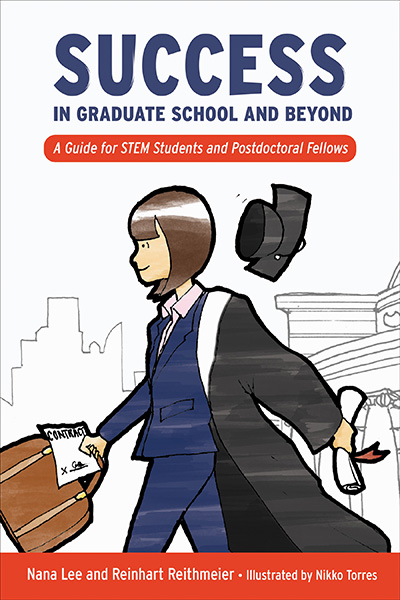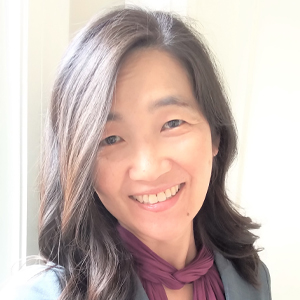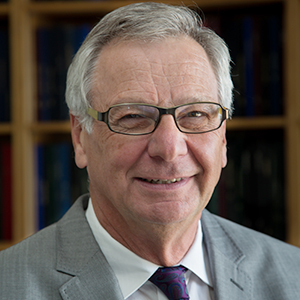A guide to success in grad school and beyond
“Success in Graduate School and Beyond” is a guidebook based on a for-credit professional development course created in the biochemistry department at the University of Toronto by the authors in 2012.
Written in a conversational style, the book is designed to empower graduate students and postdoctoral fellows in science, technology, engineering and mathematics with practical tools, tips and skill development strategies to plan and create their dream career pathway.
The book is organized into five sections that support graduate student development: self-reflection, wellness, skills, networking and planning for future success.

Success in Graduate School and Beyond: A Guide for STEM Graduate Students and Postdoctoral Fellows
By Nana Lee and Reinhart ReithmeierIllustrated by Nikko Torres
Published by University of Toronto Press
Available in paperback, hardback, ePub and pdf
Here are selected excerpts:
- “Students who enter graduate school are interested in continuing their education and training as a stepping-stone to a rewarding career. Master’s (M.Sc.) students are often interested in gaining valuable research experience. Those with an M.Sc. may go on to further education in a professional or Ph.D. program, or enter the workforce. Ph.D. students are interested in becoming experts in their discipline and making a significant contribution of new knowledge through research. Many of those who complete a Ph.D. aspire to become a professor — this is a career goal that is often reinforced by their research supervisor who may serve as a role model. “I’m a successful scientist – just do what I did and you will be successful too” is a common refrain from supervisors. Accordingly, graduate students in science focus on developing relevant technical skills and knowledge in their discipline. However, the reality today is that the majority of science Ph.D.s do not become professors but do gain positions in public or private sectors.”
- “The goal of graduate professional development is to ensure that graduates are prepared to take advantage of diverse job opportunities in the global marketplace.”
- “It is important to engage in meaningful activities beyond research to get the most out of your graduate experience, for your own professional development and to distinguish you from other graduates.”
- “A Ph.D. is a necessary credential to assume a faculty position, but the skills you develop also prepare you for other jobs in academia and in other sectors of the economy where the majority of Ph.D.s are employed.”
- “Self-assessment involves linking what matters to you (your values), what you enjoy (your interests), what you are good at (your skills) and what your characteristics or traits are (your personality).”
- “Supervisors may have little formal training in lab management and conflict resolution, but this is changing through workshops and courses that often start at the postdoctoral and early-career stage.”
- “A key element to succeed in graduate school and beyond is setting realistic and achievable expectations for yourself and your supervisor.”
- “Discuss career development plans with your supervisor, preferably early in your graduate training so you can develop options.”
- “A broad network will help you identify people who can develop into your role models or even your mentors.”
- “A leader is one who inspires and motivates others into action toward a shared vision.”
Enjoy reading ASBMB Today?
Become a member to receive the print edition four times a year and the digital edition monthly.
Learn moreFeatured jobs
from the ASBMB career center
Get the latest from ASBMB Today
Enter your email address, and we’ll send you a weekly email with recent articles, interviews and more.
Latest in Careers
Careers highlights or most popular articles

From humble beginnings to unlocking lysosomal secrets
Monther Abu–Remaileh will receive the ASBMB’s 2026 Walter A. Shaw Young Investigator Award in Lipid Research at the ASBMB Annual Meeting, March 7-10 in Washington, D.C.

Chemistry meets biology to thwart parasites
Margaret Phillips will receive the Alice and C. C. Wang Award in Molecular Parasitology at the ASBMB Annual Meeting, March 7-10 in Washington, D.C.

Decoding how bacteria flip host’s molecular switches
Kim Orth will receive the Earl and Thressa Stadtman Distinguished Scientists Award at the ASBMB Annual Meeting, March 7–10, just outside of Washington, D.C.

Defining JNKs: Targets for drug discovery
Roger Davis will receive the Bert and Natalie Vallee Award in Biomedical Science at the ASBMB Annual Meeting, March 7–10, just outside of Washington, D.C.

Upcoming opportunities
No matter where you are in your career and what future path you aspire to, everyone needs leadership skills. Join ASBMB for practical strategies for building and practicing leadership skills.

Close out ASBMB 2026 with a bang
The closing reception of the 2026 ASBMB Annual Meeting will be held at the Torpedo Factory Art Center in Alexandra, Virginia.


